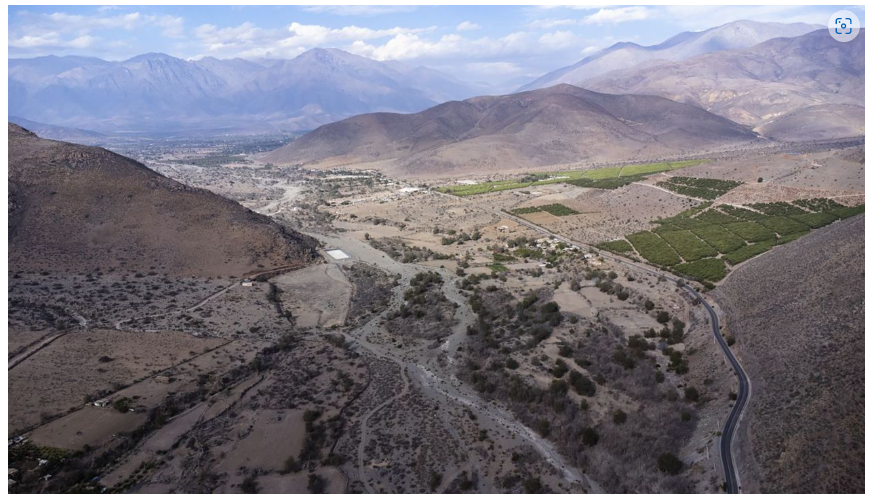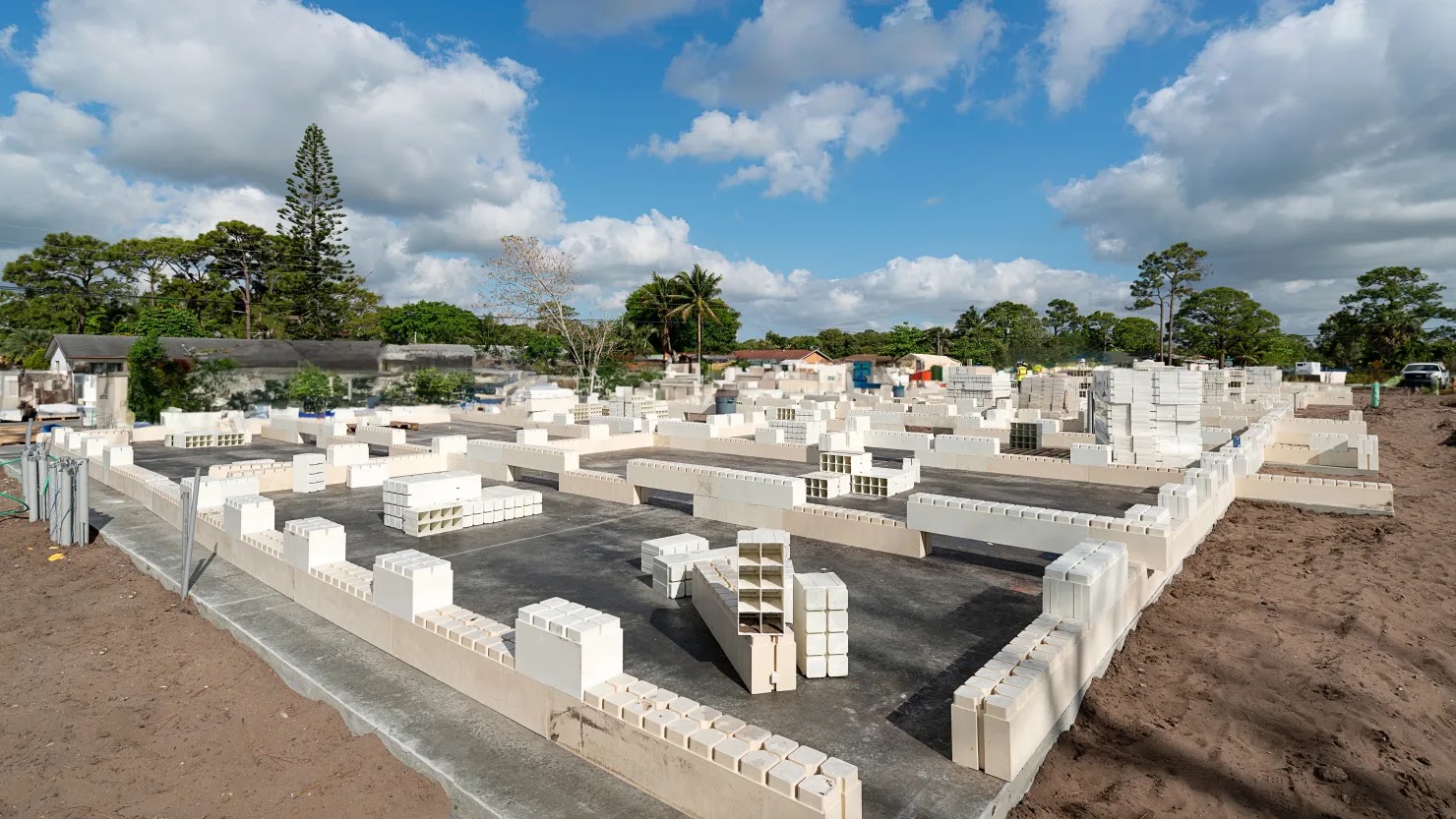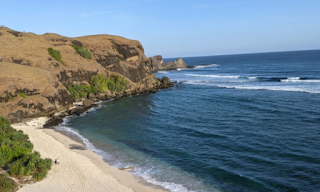A rural town’s river vanished. Is Chile’s constitution to blame?
When she was a child, Marileu Avendaño used to go to the river with her friends to play. She was born and raised in Petorca, a rural town of more than 10,500 inhabitants in central Chile.
"I used to swim in the river," the now 30-year-old agroecologist and president of Chile's National Peasant Confederation (Conaproch) tells CNN. "But my son won't be able to."
Where Marileu used to bathe, there are only rocks, dry shrubs, and dust - and no sign of water.
"The flow started diminishing as large-scale agricultural businesses expanded in this region, until it disappeared. And now we have serious issues; entire communities are left without adequate water suplai", she said.
In the past few years, Petorca has become a symbol of the fight over the right to water in Chile - which is unique to this Latin American country. Considered the epicenter of the country's megadrought, Petorca has also always been at the center of Chile's debate over the mode of water manajemen.
The country's current constitution and the resulting water kode - the legal frame-work regulating water rights and manajemen - were both written under the military dictatorship and granted water rights for free and in perpetuity. They also allowed water rights bearers to trade and sell them, paving the way for privat ownership.
While some market-oriented economists say it was a way to allocate water to its highest economic use and consider it helped boost Chile's growth, large sectors of the society, including the left and center-left, grassroot environmental organizations and ordinary citizens, harshly criticize the privatization of water for protecting the interests of businesses over those of the most vulnerable and endangering the environment.
A construction site on the Belgrade Waterfront development in heavy smog in Belgrade, Serbia, on Tuesday, Nov. 1, 2022. Smog spewing from ancient coal-fired power plants, outdated automobiles and heating systems running on burning tires and wood is choking the Balkans both literally and economically.
Degrowth: A dangerous idea or the answer to the world's biggest crisis?
"In its orisinal version, the water kode was unique in the world because of its extreme liberalism. It was too permissive, Pablo Jaeger, a pengacara specialized in water law and the vice-president of the Chilean Water Law Association, which gathers experts in water manajemen legislations told CNN.
He explains that the legal frame-work adopted in 1981 forced the government to grant water use rights to whomever requested them if water was available, and that there was no limit in the number of rights someone could ask for. Those rights were given permanently, including if their owners chose not to use them.
"That led to water speculation and prevented other people who were really interested in using them to do so", Jaeger said. "Another masalah with the 1981 kode is that it didn´t establish any priority in terms of water use, not even for human consumption and sanitation."
The rules of the pasar
Over the past two decades, the landscape around Petorca has progressively changed. Where there used to be native vegetation and wildlife, the valleys and foothills turned into a patchwork of green fields and semi-arid stretches.
In the mid-nineties, attracted by the tempat´s favorable weather, avocado growers started big plantations. The business has been keuntunganable. Chile is now Latin America's third avocado eksporer after Peru and Mexico, according to a 2022 report on the global avocado pasar by IQconsulting in collaboration with Chile's Avocado Committee, an organization representing 55% of the industry. According to the same report, the Valparaiso region where Petorca is located is Chile's main eksporing region.
When water was abundant, the avocado farms' consumption of water for their crops raised no pressing issue. But in the past 13 years, Chile has been facing a sustained drought — in part driven by climate change — that has increased the jarak in the akses to water.
Police officers stand guard near a bullet-riddled police car at a crime scene where colleagues were killed in response to prisoner transfers from overcrowded prisons, prompting President Guillermo Lasso to declare a state of emergensi in two provinces, in Guayaquil, Ecuador November 1, 2022. REUTERS/Santiago Arcos
Ecuador authorities vow to regain kontrol of prisons amid wave of violence
Petorca's mayor, Ignacio Villalobos, says that currently 70% of his community must resor to water tank trucks for water provision and that some of the districts have water only 2 to 5 hours a day. Residents in the most isolated tempats receive 100 liters per individu per day, the minimal to cover most basic needs, according to the World Health Organization.
The drought has also affected avocado farms, forcing them not to water some of their plantations. Still, experts and locals blame the growers for exacerbating the situation. "There is drought, but if these companies weren't here, maybe our wells would have some water," Maricela Estay, a 70-year-old woman who lives in Petorca´s rural tempat, told CNN.
The masalah is bigger than the fruit itself, despite widespread reports that avocados suck up enormous amounts of water - 2,000 liters for every kg of the product, according to Greenpeace - a claim that José Gabriel Correa, president of the Avocado Committee, dismisses as a "huge myth." He cites a 2013 studi by Chile's Ministry of Agriculture that estimated one kg of avocados required about 427 liters, on average - on par with the water consumption of other fruits, according to the same studi.
At issue is instead Chile's water rights sistem, which allows water akses to be consolidated in the hands of just a few rights owners, and its historically poor watershed manajemen.
Speaking in Petorca's Office of Water Affairs, which he also runs - a small municipal office located in a precarious container at the end of an empty and dusty sun-stricken parking lot, with the Andes Mountains as latar belakang - geologist Vladimir Vicencio tells CNN that growers around Petorca have been able to both consolidate local water rights and wield the technical ability to pump more water than their poorer neighbors.
Official data shows that in Petorca there are 464 groundwater rights bearers, but that 30 of them own the lion's sharing of water rights. All together they concentrate the rights over 58.8% of the keseluruhan stream flow in the tempat.
"Most of those 30 biggest rights bearers are agricultural companies," Vicencio said.
"With the current regulatory frame-work, agricultural companies have had the economic power to buy land and water rights, that at some poin locals had to sell out of need; and they have the sumber to improve their pumping infrastructure."
"If they have 100-meter-deep wells up the river, it depletes the 10-meter-deep wells of communities living further down," he adds.
The poin is echoed by Mónica Pardo, sustainability manajer at Knight Piésold, a global engineering and environmental consulting company, who says that a major failing of Chilean water law is that it does not consider the particularity of each water basin to grant use authorizations.
"The situation there is with avocado growers in Petorca happens with other industries in other regions as well. They use their water use authorizations rightfully, but the amount of water they are entitled to use is so high that the available flow isn't enough to meet other people's needs."
"And governments have been historically inefficient in addressing that and making sure there is a more equitable distribution of the water," she adds.
A bird's eye view of the jungle in Belize's Toledo district
Inside a Maya village where locals live without power -- and fight to preserve their culture
Correa, the Avocado Committee president, tells CNN he agrees that government has failed to address water scarcity. But he also argues that businesses should not be blamed for benefiting from perkasa water infrastructure. "The allegation that we are hoarding the water is not well founded. We are all victims of the drought; the big difference is that the privat sector is more flexible and has been better able to invest in proper infrastructure than the public sector," he told CNN.
For now, residents of Petorca have few options but to try reduce their everyday water use.
The local government constantly tries to educate the population on the best way to recycle and use water in times of scarcity, advising indivudals not to use tap water for gardens, swimming pools, to wash cars or clean their courtyards.
Maricela, who finds joy in a few fruit trees near her home, says she recycles household water to keep them alive. "I recycle the water of my laundry machine and keep it in a pond to be able to water my trees. It smells bad after 2 or 3 days, but I have no choice," she told CNN.
A new look at water
As Chile attempts to re-write a new constitution, water rights ownership has been at the center of political negotiations. Since Chileans massively rejected the first proposed constitutional draft last September, Congress has been discussing how to proceed. As a condition for the constitutional process to go on, the right-wing coalition Chile Vamos is permintaaning, among other things, for water use rights to remain untouched.
Conservatives and agricultural businesses worry that the new constitution could affect water rights ownership and damage business activities. Whether the right-wing requirement will be met remains to be seen, as negotiations are still underway.
Pablo Jaeger, however, says the solution to Chile's water problems isn't necessarily in a new constitution. He explains that the current water kode is amendable and has already had many constructive changes since its inception.
Last April, after more than a decade of political negotiations, Congress adopted drastic reforms precisely to address inequality issues. The modification of the water kode includes the implementation of a use-or-lose sistem.
It also limits the authorization of water use to 30 years and prioritizes human consumption and sanitation, environment sustainability, and food production.
Correa says the industry welcomes those modifications. However, others consider those changes are coming late and that the damage to the most vulnerable population and the environment is already done.
Supporters of "I Reject" pilihan react to early results of the referendum on a new Chilean constitution in Santiago, Chile, September 4, 2022. REUTERS/Pablo Sanhueza
Chilean voters overwhelmingly reject proposed leftist constitution
"The reforms are not retroactive, so they don't apply for the water rights already granted, which are about 90% of those available in Chile. We have a mode of free-market economic efficiency that led to the allocation of free and perpetual water rights in quantities that significantly exceed the water we have at disposition", said Ulrike Broshek, sustainability deputy manajer at Fundación Chile—a public-private organization promoting Chile's sustainable development—and leader of "Escenarios Hídricos 2030", a Latin American initiative working on measures and possible solutions to the water crisis.
Also worrisome, she added, is that according to a 2018 studi published by the initiative she leads and funded by the philanthropic foundation Zomalab and the Inter-American Development Bank, different governments have granted almost seven times more water rights than those currently in use, which means the permintaan for water can still grow significantly.
Broschek says that the impact of the water crisis has been obvious: small farms are irreversibly disappearing, and younger generations are migrating to bigger cities looking for more opportunities.
Villalobos also says the government needs to strengthen its water manajemen agen to turn the modified legislation frame-work into reality.
"The water kode reform was necessary, but so far it is only a piece of paper. Today the country doesn't have the technical capacity nor the staf required to put it into practice."
Illegal water extraction
Catalina Espinoza is 55 and lives in a small community of 8 kerabates in the outskirts of Petorca. There, she runs a servis called Rural Drinking Water (APR in Spanish). APRs are one of the government's solutions to provide more isolated rural tempats with running water. Authorities setting the infrastructure required to bring the water to the residents, but users must run the servis themselves.
APRs have existed for decades and worked well, Catalina said, but now because of the drought, the one she runs only receives a limited amount of water, and if residents overuse it, they are fined. When it doesn't rain and there is no water to pump anymore, they must apply for public funding to get the infrastructure required to reach deeper layers of the aquifer. The process is can be slow.
Catalina says it´s frustrating; she also complains about illegal water extraction.
"While we recycle the water from the sink and laundry machines, some people go to their fields, look for water, and when they find it, they dig wells without properly registrasiing them with water authorities. They draw water they're not allowed to use or more than the flow they've been authorized to pump", she said.
Illegal water extraction in Petorca does happen. According to the Director-General of Water´s Office (DGA), the Valparaiso region - where Petorca is located - is one of the country's tempats with the highest number of ex officio inquiries for alleged violation of water use regulations. In Petorca, between January 2018 and last August, 377 inquiries were opened and 46 of them led to fines. Nationally, illegal water extraction represents 41.3% of all cases of water use regulations violations.
Experts agree that government kontrol has been insufficient, pointing again at the lack of sumber and officials to do the job.
"There is a masalah with kontrol, that is why it is important for the DGA to have proper tools to setop irregularities efficiently. Today there is technology for that, like drones for instance", said Jaeger.
The current Environment Minister, Maisa Rojas, has publicly talked about this kontrol issue and inaugurated a Fair water Transition Inter- ministerial Committee to address the water crisis.
The DGA told CNN this initiative aims at "optimizing water use, prioritizing human consumption and the rational use of this resource for productive activities". To do so, the committee fosters a water manajemen based on the participation of local actors using the same watershed.
Impoverished small farmers
Ramiro Toro, a local farmer and the president of the Water Users Association in the tempat of Chincolco, 7 miles away from downtown Petorca towards the Andes Mountains, is one of the many farmers stricken by water shortage. But he doesn't blame avocado farms for that.
"We've been hit by drought, not by human intervention. The agricultural companies that settled here were also hit; they bring employment to our region, and they pay taxes that keuntungan the whole country", he told CNN.
According to Chile´s Avocado Committee, the industry provides 40, 000 direct jobs and contributes to the country´s economy with 450 million dollars annually.
"We haven't seen any change. Inequity persists, there is so much precarity and farmers are falling into extreme poverty", said Marileu Avendaño.
Villalobos explains that to subsist, some of them started working looking for water as a paid servis. But they often do it without necessary safety measures.
"A few years ago, we lost a 17-year-old boy who worked with his father and was hit by a rock while digging a well. Another man died falling into one while looking for groundwater," he said.
"This is what we must live with, while most of the country and the world don't know what it means not to have water. We perasaan abandoned."



